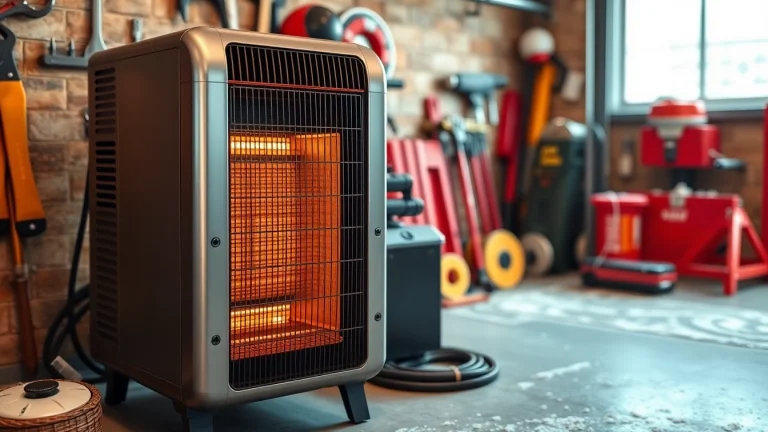
Your Essential Guide to Diesel Air Heaters for Winter Comfort
Understanding Diesel Air Heaters
What is a Diesel Air Heater?
A diesel air heater is a type of heating device that uses diesel fuel as its power source to produce warm air for various applications. It’s predominantly used in recreational vehicles (RVs), trucks, boats, and even homes, especially in colder climates. Unlike traditional heating systems that might rely on electric power or gas, diesel air heaters are driven primarily by efficiency, low fuel consumption, and the ability to produce heat quickly, making them ideal for outdoor enthusiasts and those looking for mobile heating solutions. For a closer look into these powerful tools, check out our comprehensive product range of diesel air heater.
How Diesel Air Heaters Work Efficiently
Diesel air heaters operate on a very straightforward principle. The device draws in outside air, which is then heated by the combustion of diesel fuel. The resulting warm air is forced out of the heater, providing instant heat to the surrounding environment. Typically, these devices have a combustion chamber where the fuel burns, and heat exchangers that maximize heating efficiency, ensuring that minimal fuel is consumed while maximizing heat output. They also have advanced control systems and fans that maintain even distribution of warm air throughout the area. Most models can operate efficiently, even in sub-zero temperatures, thus making them viable for a variety of outdoor conditions.
Benefits of Using Diesel Air Heaters
Diesel air heaters come with a multitude of advantages, making them a popular choice among users. Some critical benefits include:
- Efficiency: They provide rapid heating while consuming relatively less fuel compared to other heat sources.
- Versatility: These devices are suitable for various applications, from heating RVs and trucks to spaces in homes.
- Mobility: Because they are compact and relatively easy to install, diesel air heaters can be transported and used in multiple locations.
- Reliability: Diesel heaters can operate in extreme weather conditions, ensuring consistent performance when it’s needed the most.
Selecting the Right Diesel Air Heater
Key Features to Consider
When looking for a diesel air heater, certain features are critical to ensuring you select the right model for your needs:
- Heating Capacity: Look for a heater with sufficient BTUs (British Thermal Units) suitable for the space you wish to heat.
- Fuel Consumption: Choose a model that provides a balance between heating efficiency and fuel consumption rates.
- Control Options: Some heaters come with remote controls, digital displays, or app connectivity for ease of use.
- Noise Level: Diesel heaters can be noisy; opt for a model that operates quietly if noise is a consideration.
- Durability: Invest in a heater built with high-quality materials that can endure wear and tear.
Popular Diesel Air Heater Brands
When it comes to choosing a diesel air heater, several brands are known for their reliability and performance:
- VEVOR: Known for their all-in-one systems, VEVOR heaters are equipped with remote controls and efficient heating capabilities.
- Planar: These heaters are widely favored in marine and vehicular applications for their robust performance in extreme conditions.
- Eberspächer: A more premium brand, Eberspächer heaters are respected for their longevity and advanced heating technology.
- Webasto: This brand offers heaters that are usually considered top-of-the-line for both vehicles and home applications.
Comparing Price Ranges
Prices for diesel air heaters can vary widely based on the brand, features, and specifications. Here’s a general breakdown:
- Budget Models: Typically range from $100 to $300. These may offer basic heating functions without extensive features.
- Mid-Range Models: Usually priced between $300 to $600. These models often have better efficiency, higher durability, and more features like remote control.
- Premium Models: Priced above $600, premium models often include advanced technology, better materials, and extended warranties, contributing to their higher cost.
Installation Tips for Diesel Air Heaters
Necessary Tools and Equipment
Before embarking on the installation of your diesel air heater, ensure you have the following tools and equipment:
- Wrench set
- Screwdriver set
- Drill with various drill bits (for mounting)
- Hoses (for fuel and exhaust)
- Electrical wiring kit (if necessary)
- Safety gear (gloves, goggles)
Step-by-Step Installation Guide
Installing a diesel air heater may seem daunting, but following these steps can simplify the process:
- Choose the Location: Select a location that provides optimal airflow and is easily accessible for maintenance.
- Mount the Heater: Use the drill to securely mount the heater in place according to the manufacturer’s specifications.
- Set Up the Fuel Lines: Connect the fuel lines ensuring they are tightly sealed to prevent leaks.
- Connect Electrical Components: If applicable, connect any electrical wiring according to the provided instructions.
- Install Exhaust Pipe: Ensure that the exhaust pipe directs fumes away from living areas and is securely attached.
- Test the Heater: Once assembled, start the heater to check for functionality and ensure there are no leaks.
Common Installation Mistakes to Avoid
To ensure a successful installation, avoid these common pitfalls:
- Poorly Mounted Units: Ensure the heater is securely fastened to avoid potential movement during operation.
- Ignoring Ventilation: Properly venting the heater is crucial for safety; ensure clearance from combustibles.
- Neglecting Manufacturer Guidelines: Always refer to the instruction manual for specific requirements related to your model.
Using Your Diesel Air Heater Effectively
Best Practices for Safety
Safety should be your top priority when using any heating device, including diesel air heaters:
- Maintain Clearance: Keep the area around the heater clear of any flammable materials.
- Proper Ventilation: Ensure adequate ventilation to prevent the buildup of dangerous fumes.
- Regular Inspection: Check connections and hoses regularly to spot any signs of wear or damage.
Adjusting Settings for Optimal Performance
Getting the most from your diesel air heater involves adjusting settings for optimum performance:
- Temperature Control: Familiarize yourself with the thermostat settings to maintain your desired temperature.
- Fan Speed: Adjust fan speeds to find a balance between comfort and efficiency.
- Fuel Level: Keep an eye on the fuel level, refilling as necessary to prevent interruptions in heating.
Maintenance Tips for Longevity
Regular maintenance will prolong the life of your heater:
- Clean Filters: Regularly check and clean filters to ensure proper airflow.
- Inspect Hoses: Look for leaks or cracks in hoses that could impede performance or present safety risks.
- Schedule Servicing: Annual professional servicing can catch issues before they become serious problems.
Frequently Asked Questions about Diesel Air Heaters
Do Diesel Air Heaters Work in Extreme Cold?
Yes, diesel air heaters are designed to function effectively in extreme cold temperatures. Their combustion process generates significant heat output, making them reliable for providing warmth in frigid conditions.
Can You Run a Diesel Heater Overnight?
Running a diesel heater overnight is generally safe if installed properly. Ensure proper ventilation and follow safety guidelines to prevent any issues, as waking up in a warm and cozy bed is often ideal during winter nights.
What to Do If Your Diesel Air Heater Stops Working?
If your diesel air heater malfunctions, start with these steps:
- Check the Power Supply: Make sure it’s plugged in or that the fuel supply is not empty.
- Inspect Components: Examine hoses and connections for leaks or damage that may need repair or replacement.
- Consult the Manual: Refer to the manufacturer’s instructions for troubleshooting guidance specific to your model.


